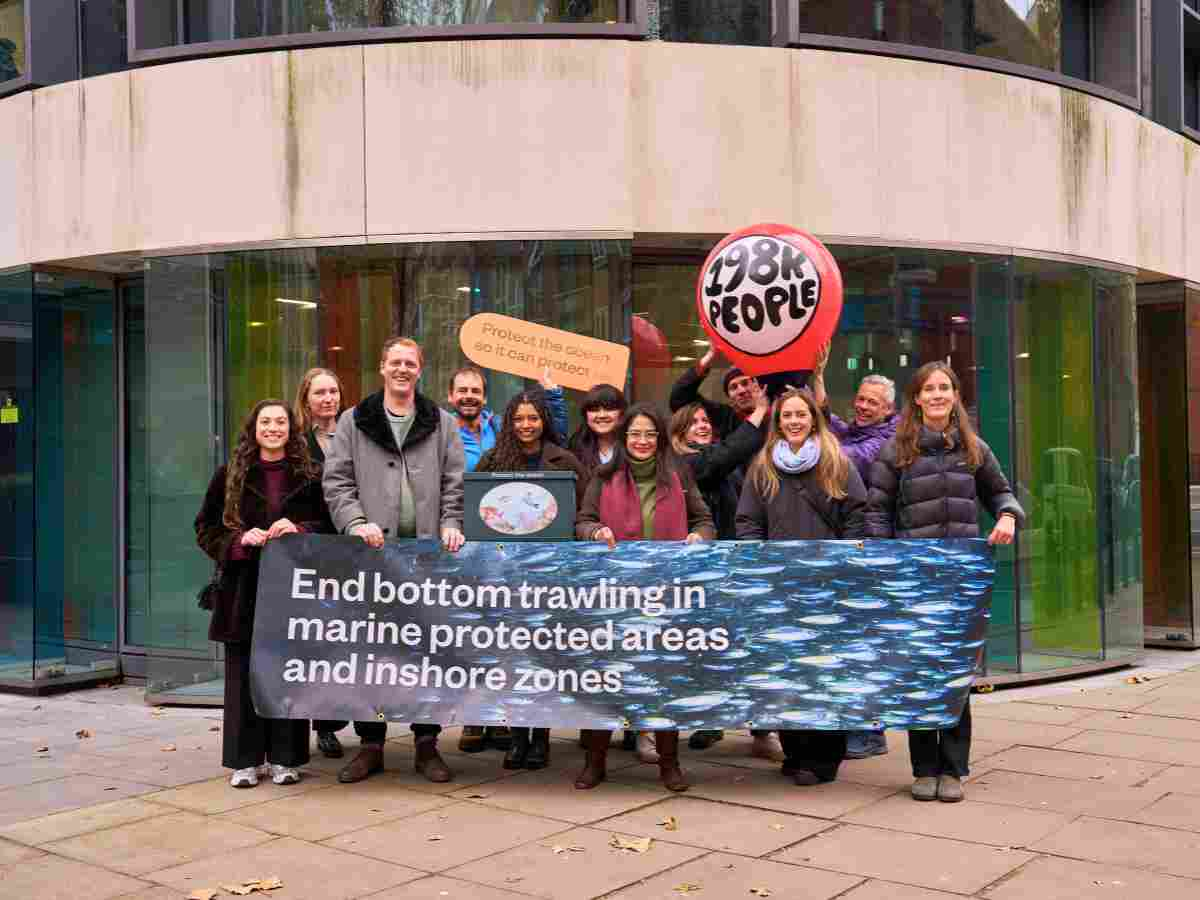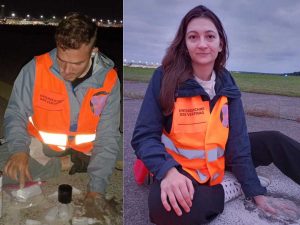On World Fisheries Day, Thursday 21 November, a coalition of ocean advocacy NGOs gathered outside the Department for Environment, Food and Rural Affairs (DEFRA) in London to deliver a petition signed by almost 200,000 people from across Europe. The petition calls for an immediate ban on bottom trawling fishing within the UK’s Marine Protected Areas (MPAs) to protect these vital ecosystems from harm, and biodiversity in the oceans more broadly:
The group included the Transform Bottom Trawling Coalition, Oceana UK, Blue Marine Foundation, Environmental Justice Foundation, outdoor brand Patagonia and wildlife filmmaker and marine biologist Inka Cresswell:
Ban bottom trawling
Despite over 35% of UK waters being designated as Marine Protected Areas, many of these regions remain at risk due to bottom trawling—a highly destructive fishing practice that involves dragging heavy nets across the seafloor.
This method not only destroys fragile habitats but also threatens marine wildlife, undermining the very purpose of these protected areas. According to analysis of satellite data from Global Fishing Watch by Oceana UK, 33,000 hours of suspected bottom-trawl fishing activity took place in the UK’s offshore MPAs last year alone. The coalition argues that without a comprehensive ban on bottom trawling, the UK’s ability to protect 30% of its seas by 2030 will fall short:
The two sites with the most apparent bottom trawling activity, the Western Channel MPA and Southwest Deeps (East) off the Cornwall coast, are both critical biodiversity hotspots, supporting species like small-spotted cat sharks and cuckoo rays. The Southwest Deeps also stores 1.67 megatons of carbon, which are equivalent to the emissions of over 1 million return flights from London to Sydney.
The petition was delivered ahead of the next phase of the Marine Management Organisation’s (MMO) consultation on the protection of MPAs, a key opportunity for the government to step up and enact meaningful change. With the MMO’s review under way, the timing of this petition delivery is crucial, as it highlights the public’s growing demand for the UK government to take definitive action to protect marine biodiversity.
An ocean emergency which the UK government is contributing to
Tom Collinson, Advocacy Manager at Blue Ventures said:
Small-scale fishers and fish workers are on the frontlines of the ocean emergency. As marine life is destroyed by heating seas, overfishing and pollution, their livelihoods are hit hardest. The UK government must take urgent action to protect both our oceans and the communities that depend on them. Banning the most destructive practice – industrial bottom trawling – from sensitive protected areas should be the starting point.
Amy Hammond, Campaign Lead at Oceana UK, added:
Any marine ‘protected’ area being bulldozed by bottom-trawl fishing is protected in name alone. We cannot continue to praise politicians for meaningless lines on a map – the public expects action. Eight in ten adults in the UK feel that bottom trawling should be banned in protected areas, our polling showed, and today, with our allies, we present Environment Secretary Steve Reed with a petition of over 180,000 voices from the UK and EU calling for an end to this destruction of our shared seas.
Clare Brook, Blue Marine Foundation CEO, said:
Bottom trawling indiscriminately ploughs through precious marine habitats. This destructive practice is allowed in the vast majority of so-called marine protected areas in the UK. Blue Marine has been working to end bottom trawling in MPAs since 2010. Banning bottom trawling from MPAs supports the recovery of habitats, fish stocks and low-impact fisheries.
The petition is part of a broader campaign, with deliveries also planned for the Spanish, French, German and Dutch governments up to December 2024. The final delivery will be presented to the newly appointed European Commissioner for Fisheries and Oceans, Costas Kadis, in January 2025.
Featured image and additional images via Duncan Nicholls







